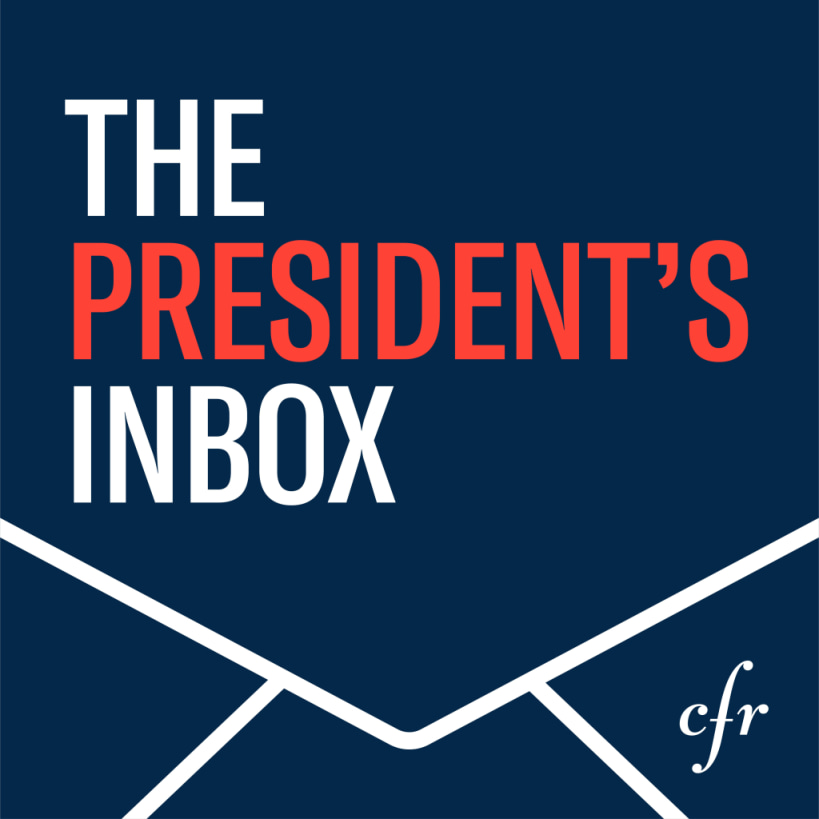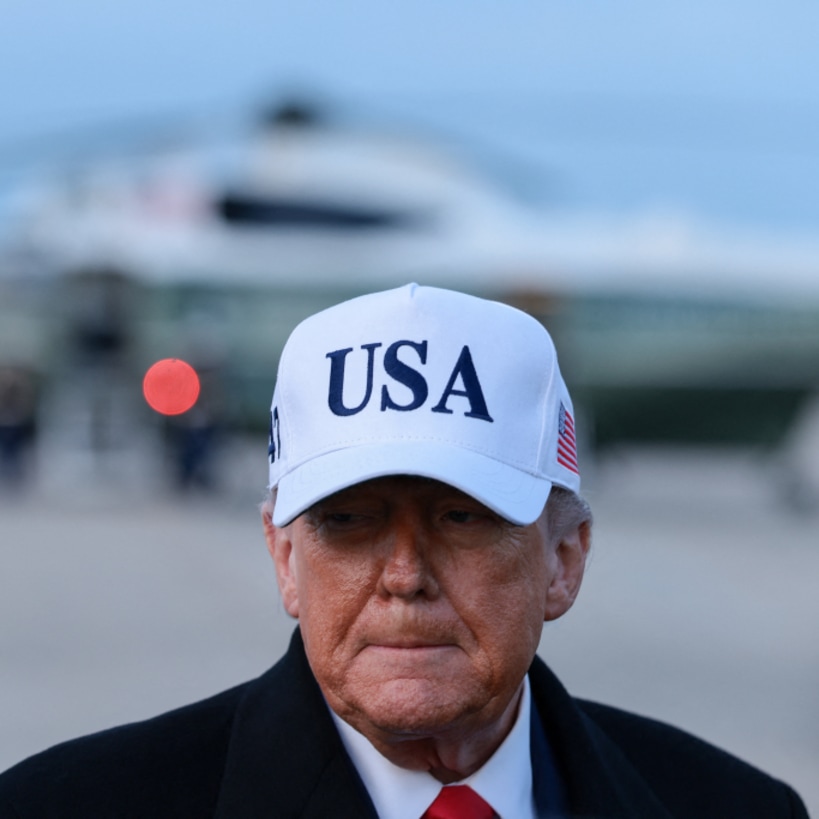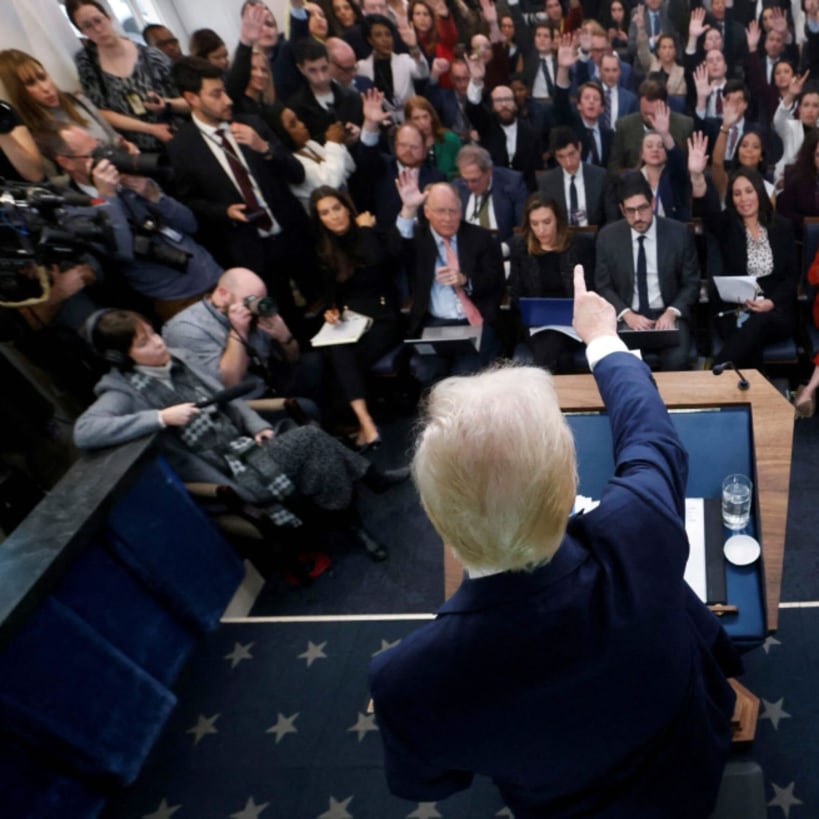China’s Economic Downturn, With Zongyuan Zoe Liu
Zongyuan Zoe Liu, the Maurice R. Greenberg fellow for China studies, sits down with James M. Lindsay to discuss the causes and consequences of China’s faltering economy.
Published
Host
- James M. LindsayMary and David Boies Distinguished Senior Fellow in U.S. Foreign Policy
Guest
- Zongyuan Zoe LiuMaurice R. Greenberg Senior Fellow for China Studies
Editorial Director and Producer
- Gabrielle SierraDirector, Podcasting
Audio Producer and Sound Designer
- Markus ZakariaAudio Producer & Sound Designer
Show Notes
Mentioned on the Podcast
“China’s Economy Is Slowing. Here’s Why That Matters,” Bloomberg
Thomas Hale and Andy Lin, “Chinese Economy Falls Into Deflation as Recovery Stumbles,” Financial Times
Zongyuan Zoe Liu, “Zero-COVID Is the Least of Xi’s Economic Problems,” Foreign Policy
Zongyuan Zoe Liu, “Beijing Needs to Junk Its Economic Playbook,” Foreign Policy
Zongyuan Zoe Liu, “China’s Pensions System Is Buckling Under an Aging Population,” Foreign Policy
Zongyuan Zoe Liu and Benn Steil, “Xi’s Plan for China’s Economy Is Doomed to Fail,” Foreign Affairs
Transcript
LINDSAY:
Welcome to The President’s Inbox, a CFR podcast about the foreign policy challenges facing the United States. I’m Jim Lindsay, director of Studies at the Council on Foreign Relations. This week’s topic is China’s economic downturn. With me to discuss China’s faltering economy is Zoe Liu. Zoe is the Maurice R. Greenberg Fellow for China Studies at the Council. Her research focuses on international political economy and global financial markets. She’s the author of the book, Can BRICS De-dollarize: The Global Financial System?, and Sovereign Funds: How the Communist Party of China Finances Its Global Ambitions. She recently co-wrote a piece for Foreign Affairs titled, “Xi’s Plan for China’s Economy is Doomed to Fail.”
Zoe, thank you for joining me.
LIU:
Thank you, Jim, for having me.
LINDSAY:
Now Zoe, for years we have heard about China’s economic miracle. In roughly forty years, China went from being an economic afterthought to the world’s largest or second largest economy, depending on the measure you prefer. As recently as this past January, experts expected the Chinese economy to come roaring back after nearly three years of zero COVID policy. But for the last several months, all I have been seeing is a drumbeat of bad news coming out of China. Let me just cite some statistics. Manufacturing is contracted for the fourth straight month. Chinese exports, in July, were down nearly 15 percent year over year. The sharpest contractions since the start of the COVID pandemic back in February, 2020. Net foreign direct investment just hit its lowest level in two decades.
So I have to ask you, Zoe, how much trouble is the Chinese economy in?
LIU:
Jim, all these headline news numbers are bad news. Even this morning, Financial Times, Bloomberg came out in news to say China is not just flirting with deflationary pressure, but officially entered into a deflationary status. Both consumer price and producer price down year on year in July. I would argue that this is perhaps too early to say this is going to be the peak moment of the Chinese economy and that China is going to decline from here on. And the reason I say that is because there are different ways that one can measure the power of the world’s second the largest economy. And if we are only looking at the GDP growth number, actually China already peaked because the fastest time of China’s double digit growth was already gone. And it was about ten years ago when China was growing at 14 percent in terms of GDP growth.
LINDSAY:
But to be fair to the Chinese, no economy is going to grow at double digits in perpetuity because the bigger you get, it is hard to maintain that rate of economic growth. So even the Chinese expected that their growth rates would fall over time. My sense is they’ve fallen farther and faster than Chinese planners expect, and I think, farther and faster that many Western experts predicted.
LIU:
I think you are right, Jim. And I think a lot of the current challenges that we are observing now is not necessarily caused by President Xi Jinping or for that matter, zero COVID policies. I remember what you described earlier this year, people were predicting that China would be roaring back and we would see a rapid recovery and yet we didn’t.
LINDSAY:
Yeah, and people were worried because you were going to get inflation around the globe because China will be out there buying things, driving up prices.
LIU:
Exactly. I guess I have always been a contrarian from that point. In November last year, I wrote an article saying that China’s economic problem is more than just a zero COVID. Even China ended zero COVID, the economy won’t be bouncing back very soon. And in January, I wrote another article saying that to what extent the Chinese economy can recover is going to be dependent on confidence, and in particular, household confidence. And at that time it seemed that I was wrong, but now it seems that market consensus is moving towards my analysis.
LINDSAY:
Well Zoe, I give you credit for that. You did call it late last year that we weren’t going to see the kind of boom that many people were predicting. I want to drill down a bit more on the nature of the economic challenges that China faces. As you point out, it’s not simply a matter of overall growth numbers. There are a variety of subsidiary issues, one of which I’d like to hear you talk about. And that is the sharp jump in youth unemployment. As I understand it, official figures, and I don’t know how accurate the official figures are in China, something on the order of one out of five Chinese youths are unemployed. I believe this has been an issue discussed widely in China. And President Xi Jinping’s response to it has been to tell Chinese youth that they need to learn to “eat bitterness.” I guess that is the Mandarin equivalent of telling someone to “suck it up, Buttercup.” Help me understand the issue with youth unemployment.
LIU:
Jim, you are right to question to what extent the number itself is precise. And I would argue that the actual youth unemployment number would actually be much higher than that and to the magnitude somewhere between 45 to even 50 percent. And the reason I say it could be that high is because the official statistics only focus on a very narrow band. They focus on city-dwelling youth aged between sixteen years old and the twenty-four years old. That is very narrow. That basically means we’re college graduates. You are already above twenty-four years old. You are not counted towards this statistics, right? So therefore, I think the actual situation could probably be worse than that and it’s very likely to be worse than that.
And I would argue that there are probably two direct factors contributed to the high youth unemployment. One is related to the skillset mismatch and that is also a reason that the Chinese government oftentimes decide. That’s why President Xi Jinping basically called out the youth to say suck it up. But the deeper down, I would say the skillset and mismatch deeper down is deeply intertwined with, on the one hand, the slowdown of the Chinese economy itself and then the so-called de-risking as global multinationals either contemplated leaving China or slow down their investment in China. So that basically means all these fancy white collar job that these highly trained youth thought they would get into, those job opportunities were no longer there. And earlier this year, the State Council also cut civil servant employment number for this year. So all in all, that basically means you have a whole generation of highly educated, highly aspiring young people when they enter into job market realizing the jobs are not there.
LINDSAY:
I imagine, Zoe, that the expectation of China’s youths could be quite significant here because they expect to be able to live a much better life than their parents or grandparents did. And again, the situation of the average Chinese citizen in 2023 is remarkably better, at least in a material sense than it was in 1956 or 1966. But that leads to another question, which sort of the opposite side of the age spectrum, which is the question of China’s ability to support its rapidly aging population. A lot has been made of the fact that China is getting old before it gets rich. Can you give us a sense of that aspect of the demographic issue and how that plays into the economy? I imagine some people are wondering, well if a lot of Chinese are retiring, doesn’t that create a lot of jobs for young Chinese?
LIU:
Right. Theoretically speaking, yes, as older people retire, perhaps there would be job opportunities being created, but that is based upon the assumption that there will be jobs available and there is no automation. The reality is actually there is the labor substitution effect created by artificial intelligence, robotics, what have you.
LINDSAY:
Technology.
LIU:
Technology. Absolutely, technology. But I would take a step back by saying that technology itself or demographic change itself, neither of those would be a crisis. Human society lived through industrialization and we know how to deal with this labor substitution effect. And then demographic challenges themselves are not necessarily a crisis because as long as you have the right set of policies to deal with it, you should be able to create a cushion. And by creating a cushion, I mean create a support network or strengthen welfare support for Chinese families and the elderly. But the reality is that China’s pension system is actually very underdeveloped by several metrics. And the pension system, especially at the local government level right now is particularly under stress because the country just lived through close to three year zero COVID policy and it created a lot of financial stress on local government because on the one hand their revenue declined. And then on the other hand, massive zero COVID testing incurred a lot of expenditures.
LINDSAY:
I think the way you put it in one of your recent articles is that China’s pension system is buckling under an aging population.
LIU:
That is correct. And the reason why I highlighted aging population is because China is not just aging but also aging at a faster speed. The World Health Organization had some rigorous estimation and the estimates suggest that within the next two decades there will be more Chinese elderly, meaning people above the age of sixty, than the entire U.S. population. So from that perspective, demographics is not necessarily on China’s side.
LINDSAY:
You don’t know, Zoe, how much it hurts me to hear you define elderly as being over the age of sixty, but I won’t pursue that avenue. Instead, I want to talk about the fact that all economies go through tough patches. I am old enough to remember the 1970s here in the United States when we talked about a misery index. Of course, we had the great financial recession of 2008, 2009, yet the United States in both instances came roaring back. So I’m wondering when we talk about China’s economic problems, do you see them as being temporary or secular?
LIU:
Before I answer your question, Jim, I will say personally I do think we need to raise what we define as elderly because the sixties perhaps is too young to be considered as elderly. And many people would argue sixties are the new thirties.
LINDSAY:
That’s how I feel, Zoe. I will sign your petition.
LIU:
Great. And in terms of whether this is secular or not, I would argue that it’s probably too early to tell. Because if we take a longer term horizon, China after Tiananmen was the moment where I often compare China then and the China now. Because China, after Tiananmen, went through a period of Western sanctions, but that period of Western sanctions was short-lived. And what you observe was that Chinese policymakers, especially Deng Xiaoping quickly came out in 1992 and injected a very healthy dose of confidence in the Chinese economy and to the world with his famous southern tour of China where he emphasized that China is going to stick with reform and open up.
I was just revisiting his speech and I was surprised, and even to a certain extent, embarrassed that I did not even recognize this before. One of his passages, he said, “It is okay to not have new ideas as long as we do not do things that make people think we are going to change the policy of reform and open up.” But now I think the Chinese government or the communist party has been doing exactly the opposite. We’ve seen major policy swings. We’ve also seen President Xi Jinping search for great ideas from dual circulation to the construction of shared human destiny. And these are exactly against the prescription given by Deng Xiaoping. And what we observe now is not necessarily that he caused a lot of these structural problem, but he made it worse.
And right now in the economical world, people talk about vibecession. The idea is that economic indicators are actually good, but people think we are going to have a recession, therefore people practice cautionary practice. And I think this is exactly perhaps the opposite in China. On the one hand, you do see government that tries to say everything is good and China is still the leading growth engine of the world without realizing that there are so many structural problems.
And I would argue that under President Xi Jinping’s leadership, a lot of the damage to the economy is not necessary to the economy itself. It’s confidence at three different levels. On the one hand, it’s Chinese people, Chinese household confidence to their own economic security. The second level would be international investors‘ confidence in whether China is going to stick with reform and open up, they have lost confidence. And the third would be China’s increased frequency of practicing coercive economic statecraft by using export controls and all that, basically damaged the confidence of the West in particular in terms of whether China is still very much interested in a peaceful rise.
LINDSAY:
Okay, there’s a lot there, Zoe. Let’s try to unpack it. As I understand it, you look at China, you have a whole variety of macro forces that are operating. You have demographics, you have technology, you have the broader global economy. Obviously, China is a country that exports a lot, can be hurt if other countries are undergoing a recession. You also have sort of things that aren’t necessarily structural, like swings in policy. As you note, the Chinese government has gone through a series of different campaigns, or at least has labeled things differently over the past several years. And that affects psychology. That is, people’s expectations about what’s going to happen in the future colors their behavior in the present day. If you think a flood is about to come, you head for high ground. If you think sunshine is breaking out, you’re going to break out the beach chairs and the sunscreen. I get all of that.
What I’m trying to understand is to what extent is the problem rooted in Xi Jinping’s decision to insert the state more into the economy since 2015? Is that the bigger issue that there’s more state involvement or is the more important thing that Xi Jinping chooses a strategy, comes up with a name and then six months later changes it? I mean, most famously, as you’ve written, you had, “We’re going to stick with zero COVID, zero tolerance up until the moment we’re going to throw it out the window as if it never existed.” So I’m trying to understand how much of this is about swings in policy versus a trend which we have seen, which is greater state involvement in the economy.
LIU:
I would argue that the current status of the Chinese economic downturn is mostly related to swings in policies and the changes. And the reason that I am suspicious with regard to state involvement is because the Chinese state has always been there. I’m aware that people are arguing the fact that China became increasingly authoritarian, hurt the economy. But I would even argue that even Deng Xiaoping, the great mind of reform and open up, he’s very suspicious of the idea of liberalism, and in particular, liberalism in the Western sense. And if anything, the way that he managed Tiananmen shows that he’s a great authoritarian leader. And there is pretty good argument to be made that if an authoritarian regime is committed authoritarianly to develop and prioritize economic development, and if such an authoritarian regime is committed to reform and open up, it actually delivers economic miracle. But what we have observed since President Xi Jinping came to power is that he has increasingly ambitious agenda, not just at home, but globally. And his expansive ambition comes at a time of economic slowdown in terms of growth. That becomes the problem.
LINDSAY:
Well, let me ask you about that because you grew up in China, you have an innate intuitive sense of how Chinese politics work. I know you must chat with a lot of people back in China. Do you think that this economic slowdown could threaten Xi’s hold on power?
LIU:
I would argue that economic slowdown in itself is not hurting his ruling, but economic slowdown combined with a sense of American containment would actually strengthen rather than undermine his power. Because with America’s export controls, and President Biden recently signed the outbound investment screening regime, so a lot of this gives President Xi Jinping an excuse to say, to describe to Chinese people that, “a lot of your suffering today, or for that matter, Chinese youth, a lot of your unemployment problem today is not necessarily because of the party is not delivering growth. We are still trying to do a lot to help you have a better future, but it is American hegemonic power that tries to contain China and even stop China’s growth.”
LINDSAY:
So this is a traditional policy of blame avoidance and blame shifting.
LIU:
Exactly.
LINDSAY:
I’m not the one who’s responsible for the bad things that are happening. This seems to be a standard play in a lot of politicians playbooks, certainly in a lot of autocrats playbooks. In the leadership of Cuba, the leadership of Venezuela, for years and decades in the case of Cuba have blamed all their economic woes on the United States. “Not our fault, it’s the great Yankee to the north.” So this is not an unknown phenomenon in world politics.
LIU:
Right, absolutely. And perhaps Xi Jinping, despite his search for great ideas, he also subscribes to blame others for his own problems.
LINDSAY:
So do you worry that this might lead to a more nationalist, more assertive, more belligerent Chinese foreign policy as Xi looks to play to nationalist sentiment given that he may be less able to provide the kind of economic growth and benefits that Chinese citizens have become used to and are hoping for?
LIU:
I do. I do become increasingly worried in terms of how the party and the Chinese government is going to play with regard to nationalism. Because traditionally, we argue that we think that nationalism is a double-edged sword and especially in a non-democratic regime. But when economy is slowing down and the party has growing ambitions, then how to finance a lot of these ambitions become a problem. Now, in order to finance a lot of these ambitions, what ends up happening would be the government has to practice harsher and harsher financial repression. The idea is implement more tighter capital controls and lower interest rate or cap the interest that depositors can keep. So a lot of this would, on the one hand, further damage Chinese people’s confidence in their economic security, and then on the other hand, make them more susceptible to different argument that the government is going to present in terms of who actually caused the economic problem at the household level.
Now, the reason I worry Chinese people may increasingly subscribe to the argument that America caused it is because on the one hand, we are still not seeing a lot of American people coming to China and there is still no direct flight between New York or DC and Beijing. And then on the other hand, there are not a lot of Chinese students, student exchange are still not resumed to pre-pandemic level. So a lot of this makes me worried in terms of what if Chinese people think blaming America, blaming the West become a easy scapegoat so that they can lash out their problems? And if it’s not America, perhaps it is Japan. And even just recently on Chinese social media, people were commenting on the flood in Beijing and Hebei and some of the comment was so nationalistic they were even saying that, “Well, let the flood go to Japan”, which I find is quite bizarre. I’ve never seen a comment like that.
LINDSAY:
Well, I will note that nationalism is a very potent force around the world, not just in China. This is not something that’s restricted to the Chinese people. And I take your point that it can create sort of a self-fulfilling prophecy as this happens. And I would imagine the Chinese media environment is closed. My understanding is it’s hard for Chinese to get access to Western media and alternative points of view.
Just a quick question on the issue of the Chinese government facing slowing economic growth, and I take it that means less state revenue or more state revenue has to go to prop up state enterprises and the like. But is it your sense that the Chinese government still has the capacity in the near term, let’s say ten, fifteen, twenty years to continue its substantial investment in building a modern military?
LIU:
I do think the Chinese government still has a lot of capacity to concentrate resources to beef up the military. Part of the reason is that on the one hand, if you look at the composition of the Communist Party, the central committee, about one third of them already have substantial science, engineering background, meaning they have the know-how. And then on the other hand, China has also developed not just the sovereign funds at the central government level, such as China Investment Corporation and all those, but there are substantial amount of other investment vehicles at the local government level as well as state-owned policy banks that are allowed or even encouraged to invest in frontier and emerging technologies that have direct implication for the military.
And then finally President Xi Jinping apparently has been also strengthening his anti-corruption campaign into the military as we’ve recently seen in terms of he replaced the top military rocket leaders. So from that perspective, I think on the one hand, he’s trying to concentrate the resources to invest in this military related technology or dual use technology. And then on the other hand, he’s trying to increase the efficiency of available resources by cracking down the misallocation of funds.
LINDSAY:
So let’s talk a bit, Zoe, about what this means for the foreign policy choices that the United States or other Western countries make in dealing with China. I take your point that we risk getting into an echo chamber in which U.S. efforts to de-risk or challenge China can sort of create this feedback or fuel this feedback loop of more aggressive Chinese behavior. So what is the right way for the United States to approach this issue of what looks to be, at least in the near term, slowing Chinese economic growth?
LIU:
I think, first of all, the United States or the Biden administration needs to separate what are the technologies that can be directly accessed by the PLA.
LINDSAY:
The PLA being-
LIU:
The People’s Liberation Army. I think it’s important for the Biden administration to at least set the baseline. These are the off limit technology and to send a clear message, not just to American community, both in terms of the investment community or technology community, so that they are educated, that they do not unintentionally participate in strengthening China’s military capacity. And then on the other hand, Biden administration really needs to focus on sending the message clearly. Convey the message, deliver the message to the Chinese leaders saying that, well, America’s true intention is not about contain China. Right now, I really do not think the message has been delivered despite that Secretary Yellen and Secretary Blinken and other cabinet level officials have all visited China.
Viewing this from Beijing’s perspective, America is doing one thing and then talking the other way. It becomes extremely difficult for the Biden administration to deliver the message. So what can be done perhaps is for the two countries to have some innovative diplomacy in the sense that, let’s just have a conversation about what are the off limit stuff. This is off limit piece of paper and then have a different set of paper to talk about. These are the things that we can work on whether it is climate change, whether it is food security, but at least we need to have two clear set of agenda so that we can deliver the message to China. We recognize there are room for us to cooperate, and we also want to let China know that China actually can continue to benefit from the existing U.S.-led system.
LINDSAY:
Let me ask you about that, Zoe, because my sense reading the Chinese reaction to a variety of Biden administration initiatives has been to say, “We are not interested in de-linking issues.” We’re not prepared to say, “Okay, we can talk about climate change and not let our thinking about climate change be affected by what you’re doing on semiconductors.” How do you get past that, especially given as you pointed out, Xi Jinping has an incentive to blame the United States for the problems that his policy swings in a variety of structural issues are causing in terms of the Chinese economy?
LIU:
That is a tough question, Jim. I would say that perhaps there is a timing issue for Beijing to want to continue the conversation and try to compartmentalize the conversation or reluctant to put down anything in agreement. And the reason I mentioned timing is because, from Beijing’s perspective, America is having an election in the coming year and there is a huge risk in terms of whether there is going to be a second Trump term or not. So from that perspective, Beijing is not completely ruling out a Trump second term. So they are betting on what if. And if there is a what if, then we would have a whole similar playbook, which I remember when Trump was elected and there was some news interview among the Chinese people and say, do you think President Trump is good or bad for China? And one person interviewed said, “Well, I think President Trump is good because it seems that he’s more easily to be manipulated.” So from that perspective, I think Beijing is not necessarily eager to talk and hence perhaps that’s what we observe from our perspective. We are frustrated that Beijing is not willing to talk.
And then finally, perhaps our cabinet level people that can talk about certain things, but the issue that we can talk about are not necessarily on the top interest of the Chinese counterpart. For example, Beijing is interested to talk about export controls, to walk back export controls or for that matter phase out the tariffs. But neither cabinet level officials that have visited Beijing so far had the power to talk about those. So from that perspective, we are really in a difficult situation and it takes some innovative thinking in terms of how to set the baseline and perhaps setting the baseline means we need to clarify to Beijing, these are the things that obviously off the limit because of military reasons.
And then on the other hand, clearly state these sets of issues are area that we can cooperate. And then finally, I would be saying that I think Biden administration have been doing a pretty good job in terms of recognizing Beijing’s trying to play a positive role in terms of welcoming Beijing’s trying to play a constructive role in Ukraine’s peace plan. At least the idea is no longer totally throwing it out. And I think, from what I read, Beijing welcomed that kind of nice gesture.
LINDSAY:
Well, that’s another entire big question that unfortunately we don’t have time to dive in because I now have to close up The President’s Inbox for this week. My guest has been Zoe Liu, the Maurice R. Greenberg Fellow for China Studies here at the Council. Zoe, thank you very much for joining me.
LIU:
Thank you, Jim, for having me.
LINDSAY:
Please subscribe to The President’s Inbox on Apple podcast, Google podcast, Spotify, wherever you listen. And leave us a review, we love the feedback. The publications mentioned in this episode, and a transcript of our conversation are available on the podcast page for The President’s Inbox on cfr.org. As always, opinions expressed on The President’s Inbox are solely those of the host or our guests, not of CFR, which takes no institutional positions on matters of policy.
Today’s episode was produced by Marcus Zakaria with Director of Podcasting, Gabrielle Sierra. Special thanks both to Bella Quercia and Michelle Kurilla. This is Jim Lindsay. Thanks for listening.






